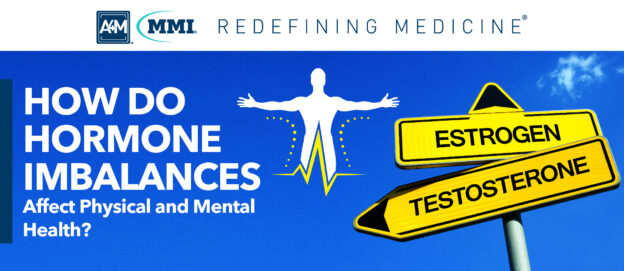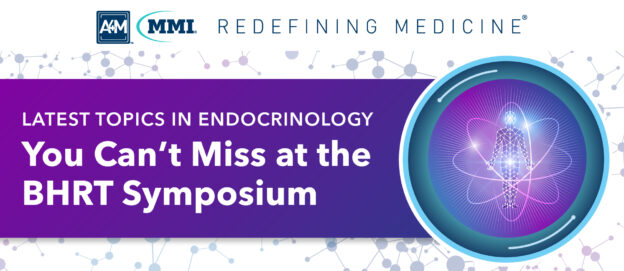The role of a functional medicine clinician extends beyond treating disease and remedying overt symptoms; the goal of patient care is to improve life- and healthspan while addressing the underlying causes of poor wellbeing. Often, this can stem from a dysregulation or imbalance in physiological systems, such as the endocrine system.
As a cornerstone of the functional and anti-aging medicine practice, bio-identical hormone replacement therapy (BHRT) can serve as a critical tool that allows patients to lead full and healthy lives at any age. The current rising demand for BHRT is emblematic of growing awareness and acceptance among the patient population of innovative hormone therapeutics, which also marks the increasing importance of up-to-date, comprehensive education in the rapidly developing field.
Our reputable Bio-Identical Hormone Replacement Therapy Symposium, which takes place between February 25-27, 2022, in Nashville, TN, gathers the world’s experts in hormone therapeutics to serve this very purpose. At the largest event in the industry, renowned speakers will review the most recent and relevant research in clinical endocrinology, analyze current evidence for and against hormone therapies, and delve into strategies for safely and effectively merging them into practice.
Latest Topics in Endocrinology and Hormone Therapeutics
From current concepts and guidelines in thyroid therapy to complete overviews of sex hormones and their multi-faceted role in human health, the three-day workshop is designed to deliver the latest knowledge in every relevant area of the specialty. Read on to learn more about a few of the prominent topics in clinical endocrinology that will be covered.
Breast Cancer Risk with Hormone Therapies
A heavily debated topic in hormone replacement therapies is the risk of cancer development associated with their use. Current scientific literature points to a slightly increased breast cancer risk in patients prescribed traditional hormonal replacement therapies (HRT). However, the level of risk correlates with a variety of individual-specific factors, including the type of HRT, duration of treatment, age of initial therapy, as well as general patient health. Additionally, the increase in cancer risk has been noted as comparatively less significant than the cancer risk associated with a high body mass index or cigarette smoking.
Meanwhile, the correlation between bio-identical hormone replacement therapies and breast cancer development risk has not been conclusively established. A lack of decisive findings related to BHRT and its impact on cancer, along with the documented increased risk associated with traditional HRT, strongly encourages a comprehensive clinical risk assessment on a case-by-case basis to determine whether the benefits of treatment outweigh its potential complications.
To learn more about the latest developments in this subject, attend Dr. Tara Scott’s session “HRT: The Clinical Benefits and Breast Cancer Risk Assessment” during Day 1 of the BHRT Symposium.
PCOS and Non-PCOS High Androgen Syndromes
While polycystic ovary syndrome (PCOS), which affects between 5-10% of the population, is the most common cause of hyperandrogenism, non-PCOS high androgen syndromes are also prevalent among women. Although the exact cause of PCOS is unknown, evidence suggests excess insulin production, low-grade inflammation, hereditary factors, and excess androgen levels. Other causes of high androgen levels include congenital adrenal hyperplasia and Cushing’s disease, which can present similar symptoms related to hormone abnormalities.
There is no known cure for these syndromes today; however, early diagnosis and treatment, and lifestyle interventions can greatly reduce the risk of long-term complications such as type 2 diabetes and cardiovascular disease. Currently, many available treatments, including hormone therapies, can be used to significantly minimize the symptoms of high androgen syndromes and allow patients to lead a normal life without complications.
To further explore the topic of PCOS and Non-PCOS high androgen syndromes, join Dr. Felice Gersh during her session on Day 2 of the BHRT Symposium.
HPA Axis Dysfunction
Referring to the hypothalamus pituitary adrenal (HPA) axis, HPA axis dysfunction is an increasingly common condition caused by chronic stress, prolonged elevated cortisol levels, and imbalanced hormones. The disorder is characterized by a range of symptoms, including chronic fatigue, mental illness, digestive disorders, inflammation, infertility, weight gain, and more.
While it is not frequently diagnosed as part of conventional primary care, integrative and functional medicine practitioners have been addressing HPA axis dysfunction for many years. Remedying the underlying hormonal imbalances is a critical component of effective treatment, alongside lifestyle changes to reduce stress levels, improve sleep quality, and optimize patient health.
Learn more from internationally renowned integrative specialist Andrew Heyman, MD, MHSA, who will lead a discussion focused on cortisol, DHEA, pregnenolone to kick off Day 3 of the BHRT Symposium.
The Bio-Identical Hormone Replacement Therapy Symposium 2022
Grounded in the most recent and well-supported research, the upcoming BHRT Symposium will provide in-depth knowledge on the relationship between hormones and overall health and identify effective ways in which clinicians can wield practical tools such as bio-identical hormone replacement therapy to treat a variety of conditions. The most significant event in hormone therapeutics is only two weeks away; sign up today to gain the latest clinical endocrinology insights from industry-leading experts.



